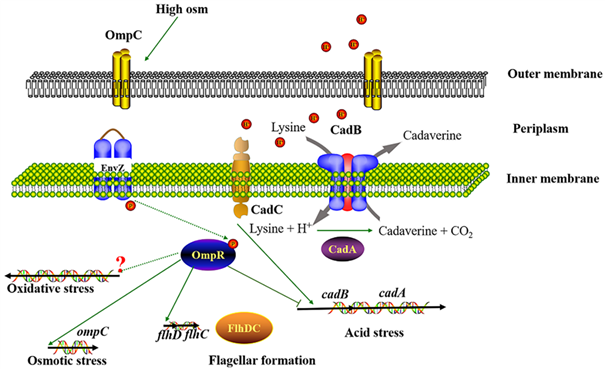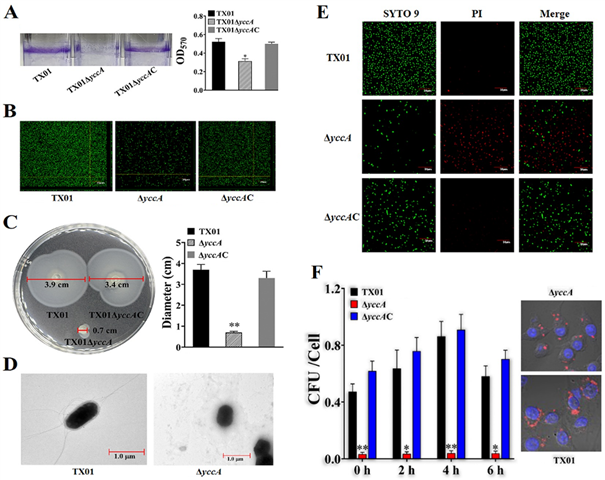The marine microbiology team of the Chinese Academy of Tropical Agricultural Sciences has made new progress in the research of virulence regulatory factors and new virulence factors of tropical aquatic pathogens. It has reported for the first time the role of the regulatory factor ompr in the two-component regulatory system of the important pathogenic bacteria of fish, edwardia ichthyoides EnvZ / ompr, in the resistance and pathogenicity of bacteria, and revealed its regulatory mechanism; This paper reports the virulence and immune escape function of a new virulence factor of Edwardsiella ichthyoides, the seven transmembrane protein ycca. The research results further promote the elucidation of the pathogenic mechanism of Edwardsiella ichthyoides and have important theoretical guiding significance for the research of new ways of prevention and control of aquatic epidemics.
Edwardsiella ichthyoides, formerly known as Edwardsiella tarda, can infect tilapia, grouper, flounder and other important economic aquaculture animals, causing significant economic losses in the world's seawater and freshwater aquaculture. Edwardsiella ichthyoides is not only an important pathogenic bacterium in aquatic products, but also a model strain in Aquatic Pathogenic Bacteria research. The research on its pathogenic mechanism has become a hot spot in this field.
Studies on the function of the regulatory factor ompr showed that knockdown of ompr significantly weakened the ability of bacteria to resist osmotic pressure, acidic pressure, oxidative pressure, antibiotics and other adversity, reduced the motility of bacteria, and weakened the ability of bacteria to infect host cells and tissues; The research on the regulation mechanism shows that under normal conditions, ompr negatively regulates the acid resistant system cadba, but loses this regulation function under acidic conditions. Ompr helps bacteria acquire the ability to resist osmotic pressure by positively regulating the outer membrane protein OmpC, and ompr regulates bacterial motility by positively regulating the flagella regulator flhDC. These results indicate that edwardia ichthyoides ompr is an important regulatory factor, which helps bacteria resist the adverse environment and invade the host by regulating multiple targets.

LysinelmoranCadcLysine +HCadaverine +CO,FihdAcid stressFlagellar formatio
The study on the mechanism of action of virulence factor ycca showed that knockdown of ycca significantly weakened the ability of pathogenic bacteria to resist high temperature and antibiotics, and greatly reduced the integrity of pathogenic bacteria membrane, biofilm formation ability and motility, thus weakening the adhesion and intracellular survival ability of pathogenic bacteria to host cells and the infection ability of host tissues; The study of pathogen host interaction shows that ycca plays an important role in a series of processes, such as pathogen escaping from serum killing and inhibiting respiratory burst. These results show that ycca is a new virulence factor of Edwardsiella ichthyoides, which can help pathogenic bacteria resist the adverse external environment, escape the killing of the host, and finally achieve the goal of successful colonization in the host.

Effects of virulence factor ycca on bacterial biofilm formation (A and b), motility (c), flagellar formation (d), cell membrane integrity (E), and pathogenicity (f)
The relevant research results of ompr were published in aquaculture, a journal of the first district of JCR, Chinese Academy of Sciences, under the title of "TCS response regulator ompr plays a major role in stress resistance, antimicrobial resistance, mobility, and virus in Edwardsiella piscicida". Huo Xiaoping, a master's student and Du Chunmei, a doctoral student jointly cultivated by the Institute of biology of the Chinese Academy of Thermal Sciences, are the co first authors of the paper, and Hu Yonghua, a researcher at Zhanjiang experimental station, is one of the corresponding authors. The research was supported by the innovation team project of Hainan Province and the innovation team project of the Chinese Academy of thermal sciences.
The relevant research results of ycca were published in the journal fish and Shellfish Immunology of the first district of JCR of CATAS under the title of "Edwardsiella piscicida ycca: a novel virus factor essential to membrane integrity, mobility, host infection, and host immune response". Jin Mengru, a master's student jointly cultivated by the Institute of Tropical Bioscience and Biotechnology of the CATAS, is the first author of the paper, and Gu Hanjie, an assistant researcher, is one of the corresponding authors. This research was supported by the Hainan Youth Science Foundation Project and the innovation team project of the CATAS.


